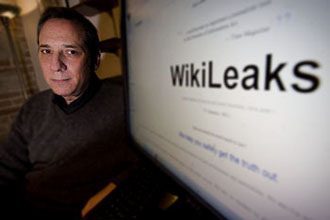Wikileaks Exposes Ethical Dilemma for Media
Since making public hundreds of thousands of diplomatic cables, Wikileaks has been a frequent presence in the media. Major news organizations hustled to run with the stories without casting a skeptical eye on the organization or its enigmatic front man, and that will continue to be the modern media dilemma, says Paul Greenberg, director of the journalism program in the Tulane School of Continuing Studies.

“There is a lot more illicitly gained information being put on the page or screen,” says Paul Greenberg, program director for journalism and media arts in the School of Continuing Studies. (Photo by Paula Burch-Celentano)
The New York Times was the major news outlet in the United States to publish the content of the first diplomatic cables released by the nonprofit organization Wikileaks. Greenberg, who also teaches media ethics in the School of Continuing Studies, believes that the newspaper should have stepped back and thought from an ethical standpoint before running the content.
“In traditional journalistic thought, this never should have been published because the New York Times didn't have the proper sources, they couldn't confirm what they had,” Greenberg says. “As a journalist I believe the information should be out there; as an ethicist, I worry about the fact we don't know if the material is accurate.”
He argues that beyond the veracity of the documents, news organizations should have considered the source before publishing. The editor-in-chief of Wikileaks is Julian Assange, a controversial Internet activist currently under house arrest in England.
“If Wikileaks was not helmed by someone like Assange, I think they could serve a purpose,” Greenberg says. “But they are, and we don't know who else is involved with the organization, so I don't know that they are serving a purpose at this moment.”
More troubling to Greenberg is that he sees the potential for this to be the rule as opposed to the exception going forward in the news business.
“We're living in a random journalistic moment,” Greenberg says. “We used to have rules and regulations that worked for the benefit of the reader or the viewer. Now we're approaching this anything-goes, anything-gets-published moment, which is to the distinct disadvantage of the consumer.”
